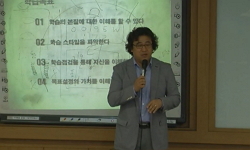This study aimed at discovering how preservice primary English teachers systematically constructed and used metacognitive knowledge, metacognitive strategies, and cognitive strategies and what contexts came into play in their use of strategy systems. ...
http://chineseinput.net/에서 pinyin(병음)방식으로 중국어를 변환할 수 있습니다.
변환된 중국어를 복사하여 사용하시면 됩니다.
- 中文 을 입력하시려면 zhongwen을 입력하시고 space를누르시면됩니다.
- 北京 을 입력하시려면 beijing을 입력하시고 space를 누르시면 됩니다.

예비 초등영어교사들의 영어학습 전략체계의 구성과 사용 = Preservice primary English teachers’ construction and use of strategy systems in learning English
한글로보기https://www.riss.kr/link?id=A82592707
- 저자
- 발행기관
- 학술지명
- 권호사항
-
발행연도
2011
-
작성언어
-
- 주제어
-
KDC
375
-
등재정보
KCI등재
-
자료형태
학술저널
- 발행기관 URL
-
수록면
273-297(25쪽)
-
KCI 피인용횟수
2
- 제공처
-
0
상세조회 -
0
다운로드
부가정보
다국어 초록 (Multilingual Abstract)
This study aimed at discovering how preservice primary English teachers systematically constructed and used metacognitive knowledge, metacognitive strategies, and cognitive strategies and what contexts came into play in their use of strategy systems. Four teachers college students in an English education program participated in this study. Their English-learning journals and a group interview comprised the data of the study. Analysis of the data revealed that the participants showed both differences and commonalities in the way they formed and used their strategy systems. In a highly organized learner, metacognitive knowledge, metacognitive strategies, and cognitive strategies were found to be linked together and used coherently, consistently, and reflectively; in the less organized learners, the three components were found to be used less so. It was also found that examining the social contexts surrounding the learners could give a better understanding of their construction and use of strategy systems. This study has a few implications for teaching and future research into strategies.
목차 (Table of Contents)
- Ⅰ. 연구의 필요성 및 연구문제
- Ⅱ. 이론적 배경 및 선행연구
- Ⅲ. 연구방법
- Ⅳ. 발견 및 논의
- Ⅴ. 결론 및 제언
- Ⅰ. 연구의 필요성 및 연구문제
- Ⅱ. 이론적 배경 및 선행연구
- Ⅲ. 연구방법
- Ⅳ. 발견 및 논의
- Ⅴ. 결론 및 제언
- 참고 문헌
참고문헌 (Reference)
1 오준일, "태도와 성별이 영어 학습 책략 사용에 미치는 영향" 51 (51): 35-54, 1996
2 이병민, "외국어 교육에서 학습자 변인으로서 언어학습 전략: 연구 동향 및 방향" 국제한국어교육학회 14 (14): 11-288, 2003
3 조현희, "예비 초등영어교사의 영어학습에 대한 신념의 양상" 한국현대영어영문학회 53 (53): 213-238, 2009
4 박영예, "대학생들의 학습전략,학습스타일,학습자 변인간의 상관관계에 대한 분석" 54 (54): 281-308, 1999
5 Wenden, A, "What do second-language learners know about their languagelearning?: A second look at retrospective accounts" 7 (7): 186-205, 1986
6 Takeuchi, O, "What can we learn from good language learners?”" 31 (31): 385-392, 2003
7 Yang,N.-D, "The relationship between EFL learners’ beliefs and learning strategyuse" 27 : 515-535, 1999
8 Chamot, A. U, "The learning strategies of ESL students. In Learner strategies in language learning" PrenticeHall 71-83, 1987
9 Van Lier,L, "The classroom and the language learner: Ethnography and thesecond-language classroom research" Longman 1988
10 Horwitz, E. K, "Surveying student beliefs aboout language learning. In Learner strategies in language learning" PrenticeHall 119-129, 1987
1 오준일, "태도와 성별이 영어 학습 책략 사용에 미치는 영향" 51 (51): 35-54, 1996
2 이병민, "외국어 교육에서 학습자 변인으로서 언어학습 전략: 연구 동향 및 방향" 국제한국어교육학회 14 (14): 11-288, 2003
3 조현희, "예비 초등영어교사의 영어학습에 대한 신념의 양상" 한국현대영어영문학회 53 (53): 213-238, 2009
4 박영예, "대학생들의 학습전략,학습스타일,학습자 변인간의 상관관계에 대한 분석" 54 (54): 281-308, 1999
5 Wenden, A, "What do second-language learners know about their languagelearning?: A second look at retrospective accounts" 7 (7): 186-205, 1986
6 Takeuchi, O, "What can we learn from good language learners?”" 31 (31): 385-392, 2003
7 Yang,N.-D, "The relationship between EFL learners’ beliefs and learning strategyuse" 27 : 515-535, 1999
8 Chamot, A. U, "The learning strategies of ESL students. In Learner strategies in language learning" PrenticeHall 71-83, 1987
9 Van Lier,L, "The classroom and the language learner: Ethnography and thesecond-language classroom research" Longman 1988
10 Horwitz, E. K, "Surveying student beliefs aboout language learning. In Learner strategies in language learning" PrenticeHall 119-129, 1987
11 Pressley, M, "Strategy-comparison opportunitiespromote long-term strategy use" 13 (13): 157-168, 1988
12 Lantolf, J. P, "S)econd (L)anguage (A)ctivity theory:Understanding second language learners as people. In Learnercontributions to language learning: New directions in research" Longman 141-158, 2001
13 Miles, M. B, "Qualitative data analysis" Sage 1994
14 Zaparta, G. C, "Preservice and inservice teachers’ metaphoricalconstructions of second language teachers" 40 (40): 521-534, 2007
15 Lincoln, Y. S, "Naturalistic inquiry" Sage 1985
16 McKay, S. L, "Multiple discourses, multiple identities:Investment and agency in second-language learning among Chinese adolescentimmigrant students" 66 (66): 577-608, 1996
17 de Guerrero, M. C. M, "Metaphorical conceptualizations of ESLteaching and learning" 6 (6): 95-120, 2002
18 Wenden,A, "Metacognitive knowledge in SLA: The neglected variable. In Learner investment in language learning" Longman 44-64, 2001
19 Wenden, A, "Metacognitive knowledge and language learning" 19 (19): 515-537, 1998
20 Flavell, J. H, "Metacognitive and cognitive monitoring" 34 (34): 906-911, 1979
21 O’Malley, J. M., "Learning strategies used by beginning and intermediate ESL students" 35 (35): 21-46, 1985
22 Rubin, J, "Learner strategies: Theoretical assumptions, research history andtypology. In Learner strategies in language learning" Prentice Hall 15-30, 1987
23 Wenden, A, "Learner strategies for learner autonomy" Prentice Hall 1991
24 Chamot,A.U, "Language learning strategy instruction: Current issues andresearch" 25 : 112-130, 2005
25 Oxford, R, "Language learning strategies: What every teacher should know" Heinle & Heinle 1990
26 Kim, Kyung Ja, "Language Learning Beliefs in Relation to English Proficiency: A Korean Sample" 한국영어교육학회 61 (61): 27-49, 2006
27 Anderson, N. J, "L2 learning strategies. In Handbook of researchin second language teaching and learning" LawrenceErlbaum 757-771, 2005
28 이은희, "Korean College Students’ Beliefs about English Language Learning" 언어과학회 26 (26): 161-180, 2010
29 Wenden, A, "How to be a successful language learner: Insights and proscriptionsfrom L2 learners. In Learner strategies inlanguage learning" Prentice-Hall 103-117, 1987
30 Riley, L. D, "Enhancing the learning experience with strategy journals: Supporting the diverse learning styles of ESL/EFL students" 1-18, 1999
31 Weber, S, "Drawing ourselves into teaching: Studying the imagesthat shape and distort teacher education" 12 (12): 303-313, 1996
32 Grenfell, M, "Claims and critiques. In Language learner strategies: Thirty years of research and practice" Oxford University Press 9-28, 2007
33 Norton, B, "Changing perspectives on good language learners" 35 (35): 307-322, 2001
34 Oxford, R. L, "Bridging the gap between psychological andsociocultural perspectives on L2 learner strategies. In Language learner strategies: Thirty years of research and practice" Oxford University Press 47-68, 2007
35 Zimmerman, B. J, "Becoming a self-regulated learner: Which are the keysubprocesses" 11 : 307-313, 1986
36 Takeuchi, O., "Applying strategies to contexts: The roleof individual, situational, and group differences. In Language learner strategies: Thirty years of research and practice" Oxford University Press 69-92, 2007
37 Wenden, A, "An introduction to metacognitive knowledge and beliefs in languagelearning: Beyond the basics" 27 : 435-441, 1999
38 Young, M.-Y. C, "A serial ordering of listening comprehension strategies used byadvanced learners in Hong Kong" 7 : 35-53, 1997
동일학술지(권/호) 다른 논문
-
A case study of an ESL child’s writing development
- 한국초등영어교육학회
- Nam, Hyun Ha
- 2011
- KCI등재
-
5ㆍ6학년 수준별 초등 영어 디지털교과서 운영 프로그램 개발과 적용
- 한국초등영어교육학회
- 박현아(Park, Hyun-Ah)
- 2011
- KCI등재
-
초등영어 원어민 협력수업에 나타난 한국인과 원어민 교사 발화 분석
- 한국초등영어교육학회
- 이새롬(Lee, Saerom)
- 2011
- KCI등재
-
Demotivating factors in learning English for elementary school students
- 한국초등영어교육학회
- Lee
- 2011
- KCI등재
분석정보
인용정보 인용지수 설명보기
학술지 이력
| 연월일 | 이력구분 | 이력상세 | 등재구분 |
|---|---|---|---|
| 2027 | 평가예정 | 재인증평가 신청대상 (재인증) | |
| 2021-01-01 | 평가 | 등재학술지 유지 (재인증) |  |
| 2018-01-01 | 평가 | 등재학술지 유지 (등재유지) |  |
| 2017-03-10 | 학회명변경 | 영문명 : The Korea Association Of Primary English Education -> The Korea Association of Primary English Education |  |
| 2015-01-01 | 평가 | 등재학술지 유지 (등재유지) |  |
| 2011-01-01 | 평가 | 등재학술지 유지 (등재유지) |  |
| 2009-01-01 | 평가 | 등재학술지 유지 (등재유지) |  |
| 2007-01-01 | 평가 | 등재학술지 유지 (등재유지) |  |
| 2004-01-01 | 평가 | 등재학술지 선정 (등재후보2차) |  |
| 2003-01-01 | 평가 | 등재후보 1차 PASS (등재후보1차) |  |
| 2002-01-01 | 평가 | 등재후보학술지 유지 (등재후보1차) |  |
| 2000-07-01 | 평가 | 등재후보학술지 선정 (신규평가) |  |
학술지 인용정보
| 기준연도 | WOS-KCI 통합IF(2년) | KCIF(2년) | KCIF(3년) |
|---|---|---|---|
| 2016 | 0.72 | 0.72 | 0.81 |
| KCIF(4년) | KCIF(5년) | 중심성지수(3년) | 즉시성지수 |
| 0.94 | 0.92 | 1.442 | 0.16 |




 스콜라
스콜라






